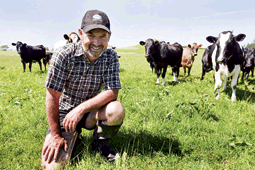George Moss finds earthquake puts things in perspective

My grumblings at nature for delivering too little or too much rain and relative grass growth seem pathetic and inconsequential given the devastation and loss of life reaped on Christchurch city over a matter of seconds. Deepest sympathies to those UK families who lost loved ones in the Christchurch earthquake.
The disaster in Christchurch has caused us to reflect again on what measures we need to put in place to protect our farming businesses, our friends and neighbours in the event of a major disaster.
For us, the key determinant is electricity; the national power grid could be severely damaged or destroyed at any point south of us by a number of known natural hazards.
As a dairy farm, it is critical that we can pump water from the ground and circulate it to troughs. Provided we can keep the freezers going we would not be short of food. We have a barbeque so we can cook. The only debate we have is whether we have the dairy “rewired” so we can milk. This would also require a significantly larger generator and substantial cost.
Both farms currently have good grass reserves and both herds are milking in excess of 1.60kg milk solids – which is pleasing, but is unlikely to be enough to offset the effect of the earlier dry.
Fonterra has announced a significant lift in milk price of 60c/kg for milk solids, which will give us the highest-ever final at about $7.70/kg.
For us the extra money will be spent on deferred maintenance on the organic farm and debt reduction on the home farm.
All farmers need to reduce debt when possible to try to maintain their equity positions in the business as land values continue to fall and to prepare for when the price declines, as it will.
